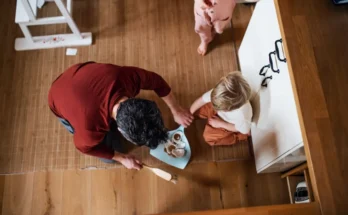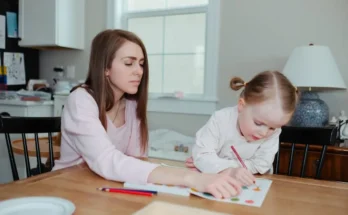Parenting isn’t a science project with clear hypotheses and formulas. It’s not a checklist or a competition. It’s a living, breathing, sometimes chaotic and always evolving journey. It’s about far more than raising obedient children—it’s about raising thoughtful, kind, resilient humans who know how to love and be loved.
More importantly, parenting also reshapes the parent. It’s a mirror, a microscope, and sometimes a magnifying glass that exposes who we are and asks us to become more. From sleepless nights to first-day-of-school jitters, parenting is an emotional symphony where each stage presents a new rhythm to master.
So what does it really mean to be a parent today? How can we parent with intention, rather than reaction? Let’s explore the art of parenting—one filled with heart, humor, and humanity.
The Foundation:
Children do not come into the world expecting perfection—they come expecting connection. At the heart of every thriving child is a secure emotional base. That begins not with toys, apps, or achievements, but with the feeling of safety: “I am loved. I belong. I matter.”
This safety isn’t only physical, though that’s important. It’s emotional. It’s the comfort of knowing they can express any feeling—fear, anger, joy, sadness—and still be met with acceptance. Creating that space, where emotions are allowed and not punished, forms the emotional soil in which confidence and resilience can grow.
One of the most valuable gifts a parent can give isn’t material—it’s attention. In a world of constant distraction, being truly present with a child is revolutionary. It’s in the quiet, undistracted moments—reading a bedtime story, building a pillow fort, asking about their day without checking your phone—that connection deepens.
Presence communicates, “You are important. Right now, nothing else matters more than you.”
Discipline vs. Punishment:
-
Understanding Behavior as Communication
All behavior is a message. When a toddler throws a tantrum or a teen slams a door, they’re telling you something—not always in the clearest way, but sincerely. Instead of reacting with punishment, parenting becomes more effective when we step back and ask, “What is my child really trying to say right now?”
Sometimes the message is, “I’m overwhelmed.” Sometimes it’s, “I feel powerless.” When we understand the emotion behind the behavior, we can guide rather than control. Discipline, in its purest form, means “to teach,” not to hurt or shame.
-
Setting Boundaries with Empathy
Children thrive with structure. Boundaries give them a sense of safety. But how we set those boundaries matters. A rule delivered with harshness creates fear. A rule explained with empathy builds respect.
For example, instead of yelling, “No more screen time or you’re grounded!” try, “I know it’s hard to stop playing, but we agreed on 30 minutes. Let’s talk about why that’s important.” This transforms discipline from a battlefield into a dialogue—and over time, kids begin to internalize the values behind the rules.
The Changing Landscape of Modern Parenting:
-
Parenting in the Digital Age
Today’s parents are raising children in a world we never experienced as kids ourselves. Social media, online bullying, endless screens, AI-powered content—all these require new parenting skills, and new conversations about boundaries, identity, and balance.
It’s tempting to try to shield children from it all, but a better strategy may be guiding them through it. Teaching media literacy, helping them critically assess what they see online, and modeling healthy digital habits become crucial parenting tools.
Technology isn’t the enemy—disconnection is. And staying connected to our kids, even as they explore digital worlds, is more vital than ever.
-
The Rise of Conscious and Gentle Parenting
There’s a quiet revolution happening in parenting philosophies. More parents are turning away from punitive, authoritarian models and embracing conscious, gentle parenting approaches that prioritize empathy, mutual respect, and emotional intelligence.
This doesn’t mean permissiveness. It means parenting with awareness—of your child’s needs, of your own triggers, and of the long-term values you want to instill. It means asking not, “How do I get my child to obey?” but, “How do I raise a child who thinks for themselves, cares for others, and feels secure in who they are?”
Cultivating Connection Through the Years:
As children grow, so do their needs—and their distance. Teenagers may push away, asserting their independence, but that doesn’t mean they need their parents any less. They just need them differently.
What begins with teaching a toddler to tie their shoes evolves into late-night talks about friendship, identity, and dreams. It requires adaptability, patience, and a steady hand even in emotional storms.
Staying connected through transitions means creating rituals of presence, whether it’s weekend breakfasts, evening walks, or car rides that double as therapy sessions. What matters is that your child knows: no matter how much they change, your love does not.
Conclusion:
Parenting is not a role we perform—it’s a legacy we leave. It’s not measured by grades, trophies, or tidy rooms, but by the kind of people our children become, and how they treat others and themselves. It’s the love they carry, the values they live, and the memories they cherish.
It’s okay to stumble. To cry in the bathroom. To laugh uncontrollably during a bedtime story. These moments—imperfect, unpredictable, real—are the essence of parenting.
So wherever you are on your parenting journey—brand new or seasoned and sleepless—remember this: you don’t have to be perfect. You just have to be present, loving, and willing to grow.
Because in the end, parenting isn’t about controlling a child. It’s about guiding a soul. And there’s no greater art form than that.




